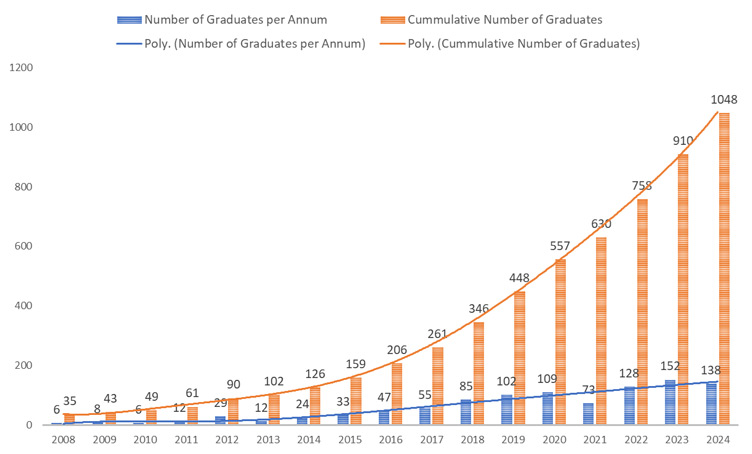RCSI/COSECSA Collaboration Programme
 In Sub-Saharan Africa, 93% of people lack access to safe surgical care when needed. A significant contributing factor in this is the acute lack of surgical care providers.
In Sub-Saharan Africa, 93% of people lack access to safe surgical care when needed. A significant contributing factor in this is the acute lack of surgical care providers.
Since 2007, RCSI has supported the College of Surgeons of East, Central and Southern Africa (COSECSA) to improve the standards of surgical care in East, Central and Southern Africa by advancing surgical education, training and examinations.
This deep and wide-ranging collaborative programme is supported by Irish Aid.
Supported by the collaboration programme, COSECSA has grown to be the largest single contributor to the surgical workforce in the East, Central and Southern Africa region, with 1,350 surgical trainees currently enrolled across 15 member countries and in accredited training sites in other countries in Africa. 1,183 surgeons have graduated as of December 2025.
This infographic summarises the COSECSA surgical training eLogbook for the year 2024. It provides an overview of surgical procedures logged by COSECSA trainees, showcasing the distribution of surgical operations by country, the types of surgeries performed across various specialties, and the demographics of patients involved.
Additionally, it highlights the number of surgical trainees and their roles in operations, emphasising the balance between elective and emergency procedures.
You can also download an infographic of our surgical training eLogbook that encompasses 2015 to 2024 below.
There is a perception that there is a 'brain drain' of skilled health workers from lower income countries emigrating to higher-income countries. However, research shows that 93% of surgeons trained in East, Central and Southern Africa, remain in the region – 'brain drain' of this cadre of healthcare worker is a myth.
COSECSA-trained surgeons perform on average between 300 to 400 major surgeries a year. They also become trainers for the next generation of surgeons, thus exponentially increasing their impact on surgery in the region.

The collaboration has expanded to support the training of other members of the surgical team, working with the:
- College of Anaesthesiologists of East, Central and Southern Africa (CANECSA) – see Building Anaesthesia Training in the ECSA Region programme for more information
- East, Central and Southern African College of Obstetrics and Gynecology (ECSACOG)
- East, Central and Southern African College of Nursing (ECSACON)

- Development of administrative and operational tools and systems
- Examination and training support
- Development of training faculty
- Building a research culture and strengthening the COSECSA journal
- Developing bespoke e-learning resources and COSECSA e-learning platform
- Continuous development and analysis of the COSECSA e-logbook
- Business development, strategic and financial planning, fundraising and sustainability planning
- With ECSACON – Developing an online in-service training programme for perioperative nurses
- With ECSACOG – Conducting a cross-sectional study of the obstetrician/gynaecologist workforce in East, Central and Southern Africa
- Supporting essential surgical training in rural areas for the benefit of rural patients
- Advocacy
The RCSI/COSECSA Collaboration Programme is funded by the Irish public through the State's development arm, Irish Aid, which has provided over €5m funding since 2008.

RCSI's work with COSECSA has resulted in online, print and broadcast media coverage of the programme, and assisted in raising the profile of the ongoing work of COSECSA in the region.
- Making all deaths after surgery count, The Lancet, 29 June 2019
- Women in Surgery Africa and research, The Lancet, 25 May 2019
- Separating conjoined twins: ‘This is our landing on the moon’, The Irish Times, 6 November 2018
- 'Solving Africa’s chronic shortage of surgeons', The Irish Times, 15 November 2017
- 'Rose of Tralee and doctor-to-be Elysha Brennan in Tanzania', The Irish Times,16 August 2016
- 'Health Groups must turn the world upside down', Irish Medical Times,29 April 2016
- 'Surgery remains the neglected stepchild of Global Health', The Irish Times, 13 July 2015
- 'Ireland Donates Virtual Reality Technology to Train Surgeons in Africa', thejournal.ie, 11 July 2014
- 'Hi-tech surgical unit to help African surgeons', RTE Six One News, 10 July 2014

Publications
The team
The RCSI/COSECSA Collaboration Programme works through a large and diverse team of collaborators from RCSI and other institutions. Key Irish institutional partners are the College of Anaesthesiologists of Ireland and Institute of Obstetricians and Gynaecologists in the Royal College of Physicians of Ireland.
The important contributions of the RCSI Department of Surgical Affairs and Faculty of Nursing & Midwifery must be acknowledged.
RCSI/COSECSA Collaboration Programme management and leadership includes:
- James Geraghty (RCSI Co-Chair of the Steering Committee)
- Lucia Brocato (Programme Manager)
- Godfrey Sama Philipo (Research and Patient Outcomes Coordinator)

